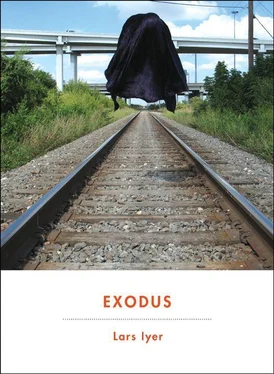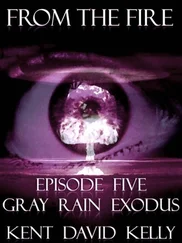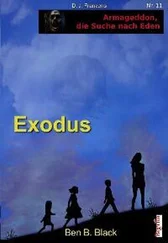Thinkers with neck-kerchiefs, W. says. Thinkers with cravats. Thinkers with Hawaiian shirts (Jean-Luc Nancy, after a trip to the USA). Thinkers in plus-fours (Jean-Luc Marion, heading up to Cambridge to try and impress the dons). Thin thinkers, in roll-neck sweaters, with sharp cheekbones and shaved heads. Tubby thinkers, epicureans full of joy, with great, jolly faces and thick folds of fat at the back of their necks. Worker-thinkers, with thick, flat fingers and spadelike hands, who’d laboured alongside others in the fields and the mines. Serene thinkers, half godly, looking into eternity with widely-spaced eyes.
Laughing thinkers, who laughed because they could think, because they were free to think. Thinkers who’d escaped from imprisonment and war. Saintly thinkers, of unimaginable integrity, of absolute purity. Nomadic thinkers, who, like swifts, never touched down, moving only from conference to conference as invited speakers. Traveller thinkers, who had forsaken the lecture circuit for private voyages through jungles and deserts. Ascetic thinkers, who spoke of great solitudes, great retreats. Thinkers who had seen things, lived things that were greater than they were.
Thinkers who knew what it meant to live. Thinkers who served life. Thinkers who thought in order to live, and to be alive. Thinkers who spoke of the ecstasy of thinking after their talks, in the student bar. Thinkers who spoke of the beatitude of thought , tears glittering in their eyes. Thinkers who said, the only thing that mattered was to think .
Bearded thinkers, with great bushy beards like Marx’s, or tidy, trim beards like Lenin’s, or goatees like Trotsky’s, or — very rare — neckbeards like William Empson’s. Nonagenarian thinkers. Centerian thinkers! And thinker-youths, no more than twenty years old, mere pups, with minds like steel traps.
Thinkers who’d been imprisoned for thinking, W. says. Thinkers who’d been half-crucified for blasphemies of thought . Thinkers whose tongues had been ripped from their throats. Mute thinkers, whose papers were read for them. Thinkers whose voices were hoarse from screaming. Thinkers who refused to think , out of shame, and refused to read their own paper, out of modesty.
Humanist thinkers, dripping with pathos, W. says. Anti- humanist thinkers, siding with viruses, siding with plagues, waiting for the demise of ‘man’. Thinker-fanatics, full of hatreds and ecstasies. — ‘Your kind’, W. says.
The Essex postgraduates met them all, W. says. All the thinkers of Old Europe.
We’re hungover. The light hurts our eyes. ‘Is there hope for us, any hope?’, W. wonders on the bus out from Plymouth to Dartmoor.
‘ The destiny of this life is that it be brought to the uttermost of life-disgust ’: that’s Kierkegaard, W. says, reading from his notebook. Have we reached that point? W. wonders. The uttermost of life-disgust : how hungover would we have to be, to be brought to that? How much would we have to had drunk?
It’s the kind of day you might come across a corpse, we agree, as we walk out on Dartmoor. It’s the kind of day someone might come across our corpses.
‘God’s watching us’, W. says. ‘Can you see?’ But I can see only brown bog and the overcast sky.
W. tells me about the wild Dartmoor ponies, left to wander on the moor. And he tells me about the Beast of Dartmoor, which attacks the ponies, leaving their entrails steaming in the morning sun.
W. points to the abandoned longhouses of the high moor, more than a thousand years old. One day they’ll be occupied again, W. says. One day, there will be people who come up to the moor, looking for shelter. Exiles, like us. Freed slaves with long hair and guitars, as gentle as deer …
The rain clears. The open sky. — ‘It’s come to this’, W. says. ‘The final reckoning’. And then, ‘You can’t hide on Dartmoor. You can’t keep secrets’. And then, ‘It’s just us and our God. The God of twats’.
They’ll find us lying prone, with our eyes pecked out. They’ll find our bodies half-eaten by the Beast of Dartmoor. Yes, that will be our judgement.
We’ve gone missing, W. says. Well, he has. They should send out search parties. There should be men with loudhailers calling his name. He’s lost on the moor, W. says — on my moor. He’s lost in the wilderness, W. says — in my wilderness.
Melancholy, melancholy: sometimes W. feels half-drowned by its waves. And don’t I feel something of it, too, as we wander through the heather?
The melancholic cannot leave behind what he mourns, Kierkegaard says. He comes to identify with his loss, to think of himself as nothing other than his loss. His life, his very existence, is indistinguishable from a kind of tomb .
The melancholic tends not to know what he’s lost, Kierkegaard says. He has only a vague sense of deprivation, a general sense that something has gone missing. God: should that be our name for it? W. asks. God: is that the name for our loss? W. wonders.
Sometimes he wants to curse God, W. says, as Kierkegaard’s father did as a young man, herding his sheep on a Jutland heath. But he doesn’t believe in God, W. says. So how can he curse the non-existence of God? How can he shake his fist at the sky?
At other times, he wants only to localise his loss, W. says. And he doesn’t need to look further than the idiot beside him in his cagoule. ‘ It must be the idiot’s fault! ’, W. thinks to himself. He wants to shake me, to grab me by the lapels and bellow, ‘It’s all your fault!’ Because it is my fault, he’s sure of it.
But what if he’s wrong? What if I’m only a scapegoat for his problems? The Hebrews used to send a goat into the wilderness, which was supposed to carry with it the sins of the people, W. says. And is that why W. has brought me up to the moor, he wonders: to send me into the wilderness, carrying all his sins away?
‘ There goes my loss ’, W. would say, watching me disappear into the distance. ‘ There go my sins ’. And he’d walk more lightly on his way back to the bus stop. He’d sing to himself. The clouds would part …
But what if grief remained with him, and as heavily as before? What if despair never lifted itself from his shoulders? Horror: now he’d be alone with the storm-cloud of his grief. Now he wouldn’t have an idiot in a cagoule to blame for his melancholy.
Am I his Abraham or his Isaac? W.’s never been sure. Will I take him to be sacrificed on Mount Moriah, or will he take me? God’s told him nothing, W. says. He’s listened in vain for the command to lead me to the mountain.
But what has God told me? If I know anything, I’m keeping quiet. In fact, I’ve been especially quiet lately, and W.’s caught me looking off into the distance, as if seeking out a local equivalent of the Biblical mountain.
But perhaps the sacrifice has already occurred. Haven’t I ruined W.’s reputation ? Haven’t I publically humiliated him again and again? God never stayed my hand, W. says. God never told me to sacrifice something else in W.’s place. He’s an Isaac whom God did not deign to save, W. says.
W. thinks of Job on his ash pile. Job, afflicted with boils, his possessions destroyed, his children killed, sitting scraping his skin with shards of broken pottery. Job, who, when his wife told him to curse God, reproached her: ‘ Shall we receive good from God and not receive evil? ’
Never did Job question divine providence. Never, even though he cursed the day he was born.
Читать дальше












